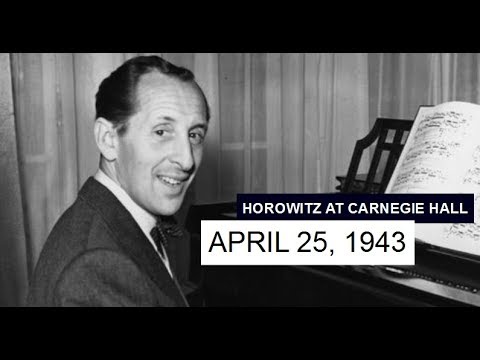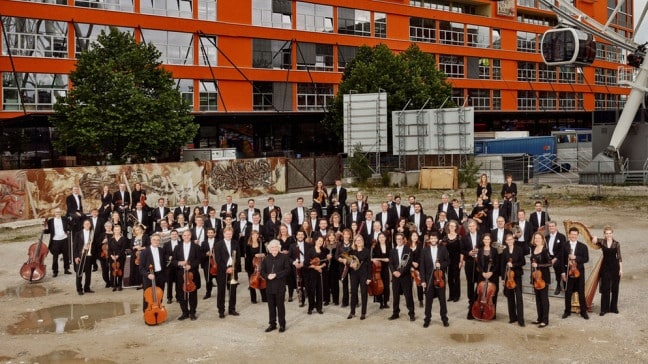No-one could play this like Horowitz
mainRichard Rodzinski has alerted us to the Horowitz /Rodzinski/ Rachmaninoff # 3 concerto with the New York Philharmonic from 1943, restored recently by Seth Winner.
Pianophiles are aghast at the flurry of notes from 1:03-1:09 at a speed that defies human capacity.
Has anyone done it better?






Has anyone done it better ? Almost everyone
You are free to reveal your level of ‘sophistication’ to the world, but n.b. amongst the people who would most vigorously disagree with you is Rachmaninoff himself (https://www.rachmaninoff.org/forum/the-life-of-sergei-vasilyevich-rachmaninoff/when-horowitz-and-rachmaninoff-met-491) But maybe if he wore some underwear and angel wings…
Not anyone, but Trifonov for sure has both the technical chops and arguable the greater reserves of emotion.
Boo….
Maybe Martha. Ashkenazy not too far behind.
Ashkenazy, Kissin, Gilels, in that order.
Sokolov, not the fastest but definitely the best Rach.3
Nope, Ashkenazy’s is the best, but maybe I am very slightly biased!! Kissin’s is also pretty fantastic. And Gilels’.
WOW! three days without news from whether it’s the invitations to someone’s hotel room or the interviewer’s office, and we’re onto more of Rocky’s horror show.
No one could play like Horowitz full stop.
And let us be grateful for that exclamation mark.
Thank goodness for that; one is bad enough!!
Listen [and watch] his variations on themes from Carmen at the White House and see if you can even see his hands moving rather than a continuous blur towards the finale, so fast was his movements.
Speedy hands do not make a great pianist.
In fact, if you watch any of the true giants, Rachmaninoff himself, his favorite pianist (Benno Moiseiwitz, not VH), Richter, Arrau, you will see pretty much the same thing. In terms of piano technique, which is what you really seem to be discussing, Y. Kissin and Y. Bronfman are also hard to beat.
Ashkenazy.
It’s a great but with a few notes missing. Rachmaninoff did it better when he played it with Mahler in an icy cold Manhattan (Carnegie Hall) on January 16th, 1910.
Incidentally, Rachmaninoff said he wrote this concerto, for elephants.
I envy your being there to hear that 1910 concert.
How would you know? Were you there?
Rob, you were there in 1910??
I do agree that it’s a great performance, unfortunately with a missing section in II.
I grew up listening to my vinyl RCA recording of Byron Janis. That will always be the gold standard for me. His phrasing sounds more natural and fluid and still maintains the speed.
Janis’ RCA recording was marvellous for me as well, natural, fluide, passionate and brilliant…only the orchestra, (Boston/Munch) is disappointingly passive and ill-defined. RCA recordings killed most pianists’ sounds and orchestras too; exception: Chicago/Reiner.
The Janis/Dorati Mercury is surely the better one?
Starting in 1930, Horowitz is heard playing Rachmaninoff’s third concero with Albert Coates, Artur Rodzinski, Fritz Reiner, Serge Koussevitzky, Subin Mehta,and Eugene Ormandy. I like the last. Only with Ormandy do I hear the strings’ after-beats in the first bars. Horowitz keeps control with increasing power and insight over the decades.
Rachmaninoff acknowledged Horowitz’s ownership of this concerto and stopped perorming it after hearing Horowitz.
Certainly Horowitz played a part in this “ownership” but it was, surprisingly, a broadcast by Walter Gieseking(!)- according to Rach’s correspondance, which jolted him to abandon playing the 3rd in concert.
“Has anyone done it better?”
Yes – Kapell, Argerich, Ashkenasy, Weissenberg, and Rachmaninoff himself.
Horowitz had very fast fingers and hands but the actual sound of his playing was terrible. And he liked that dry hard pingy sound he got: that’s how he insisted his piano be adjusted.
Rachmaninoff liked Horowitz, he also valued Gieseking very much after a live performance that he attended.
Basic English: No one (no hyphen)
The verb ‘alert ‘means:
warn (someone) of a danger, threat, or problem, typically with the intention of having it avoided or dealt with.
“He alerted people to the dangers of smoking”
Similar: warn, notify, caution, forewarn, put on one’s guard.
Richard did not alert SD, he merely shared what he had discovered about Horowitz. This is not a warning, but a recommendation.
I would like to point out that there are those among us who absolutely loathe Horowitz’s playing. This should in no way influence those of you who like it, because all art criticism is entirely subjective, but you should at least understand that there is another point of view.
I could understand not thinking VH is the best (whatever that means), I understand having other favorites, I understand being critical, I understand how VH performed some composers magnificently, others were not his strong suit, but to “loathe” his playing (and what period of his career are we talking about?) honestly says more about the person saying it, and speaks of a certain immaturity. I could say more, but when someone posts a superficial attention getter-such as the first one-“almost everyone else” why bother.
Horowitz made his American debut at Carnegie Hall in the Tchaikovsky First Piano Concerto, with Thomas Beecham conducting. They couldn’t agree on tempo, with Horowitz thundering through the piece and the NYT reporting, “The piano smoked at the keys.” Rachmaninoff was in the audience that night and he told Horowitz, “Your octaves are the fastest and loudest, but I must tell you, it was not musical. It was not necessary.”
How about Rachmaninoff himself, or his favorite pianist, Benno Moiseiwitz? I also like Yefim Bronfman of the current crop of pianists. Of course, VH was also a great pianist.
Rosina Lhevinne told me that in Russia they were encouraged never to compare artists by their teachers.
“Pianophiles are aghast at the flurry of notes from 1:03-1:09 at a speed that defies human capacity.”
Really, it would be nice to name them, then. The man who wrote that “flurry of notes” also performed them really well.
Let’s get off the horse that VH was the greatest ever; he was very, very good. There have been others of extremely high caliber including Rachmaninoff himself, Moiseiwitz, Cortot, Gilels, Richter, Arrau, etc.
Horowitz was one of the most electrifying pianists ever.
That’s where his greatness lies (along with many other qualities).
Ashkenazy.
One is still going on about these stupid Rachmaninoff concertos, where just like Brahms he klunk puts the recapitulational second or whatever theme transposed without considering the resonance that’s there when the VIBRATION of every note has changed, and not just to name it within some stupid test to see if they all changed in relationship to each other completely disregarding their relationship to everything outside of that!?
Like lets build a transportational vehicle and when it can go to wherever it wants to have people running it that don’t care to consider you can’t breath on the moon, or other places. This is like something for the government to steal a telepathically directed spaceship of Otis Carr because it would ruin the world economy supposedly, and is listed as an attempt at such, and then try to get good willed people to do such or worse things with it.
Good Heavens!
What a waste of what music could be, and of course things are going down the drain with classical music, that every up and coming good willed pianist is supposed to sell this junk like some cheap import they use as an entrepreneur to make it big.
??????
Oh my……….
And if: it’s not moving it must be rock music, or is it just that mountain again gone!
I like others also, Greg, especially Byron Janis,Kapell and Weissenberg. I don’t know Gilels’s. Rachmaninoff dedicated the third to Josef Hofmann, who never performed it. I’ve seen Matsuev play it with Gergiev, as well as I expect to. I never saw Horoitz.
Flambeau mentions Benno Moiseiwitsch, whose playing Rachmaninoff liked while asking RCA why Moiseiwitsch’s records of his music sold better than his own.
They talked backstage after a Moiseiwitsch recital about the Prelude in B minor and found both associaed it with the idea of a return, or The Return.
There are recordings of Moiseiwitsch playing the first and second concertos and Paganini Rhapsody, but none of the third concerto which he rarely performed. There’s also no recording of the third by Richter, and I’ve never heard or read of his performing it.
Gieseking was a surprise, the second and third live with Mengelberg I think, and Cortot played the third with Rachmaninoff conducting and vice-versa.
Hi Edgar,
Yes, I should have mentioned Janis in my posting above. Moiseiwitsch, too.
It would be great to hear the Rach/Cortot combinations, but Rach, as you probably know, disallowed broadcasts of his concert performances.
If only small battery-powered recording devices
existed then!
Horowitz was unique in his quasi-kinetic effect, experienced live, in the heat of the moment. Much of this doesn’t transfer well to recordings, especially in dreadful, dry RCA sound. He was not a particularly “fast” pianist; many are speedier. But the “spirit” of virtuosity is not in speed alone. Many of us are unimpressed, rather- bored by flying fingers alone; the piano is easy to play “fast!” The Marthas, Cortots, Giesekings and, (dare i?) Yujas…(sorry!)- possess not just speed but a sort of devilish elegance, fury, drama & poetry which defies definition. Horowitz often gives an impression of “speed” just by his devilish expression rather than by velocity.
Most of VH’s Rach3s -studio, live or pirate, are full of faults in the detail. But most are worth hearing at least once. I understand those who, these days, heartily dislike, or can’t understand his recordings; VH was at the extreme of a very personal musical, and pianistic expression. But the experience remains indelible for most who heard him live in his flashes of inspiration.
Steinway Demolition
Boris Giltburg does a very fine Rach 3.
Seth Winner has restored the complete version of this broadcast, which has long existed in a fragmented version (posted here). Apparently it will be issued eventually, it is available to listen right at the NYPO archives in person, but not online.
The exact date has been identified as April 23, 1944.
More info here:
https://www.arsc-audio.org/chapters/pdf/ARSCNYFLYERx14_FINAL.pdf
I’ve been patiently waiting for an official release for 6 years…. hopefully it comes out soon.
Emil Gilels forever!
the whole orchestra in Christopher’s fingers https://www.youtube.com/watch?v=yh0BALM_DZY&app=desktop
Have we mentioned Van Cliburn at all? He went for grandeur but ended sounding still to me, although Kondrashin was an asset. I need to hear Gilels, whom I’ve somehow missed.
Rafael Orozco was great in this cadenza, (great performance over all.) Also Lazar Berman, although he takes the ossia, adopts a majestic approach to great effect. Seemingly limitless power.
If speed is the criterion, then the thoroughbred Horror Wits wins the race, but music is left by the wayside.